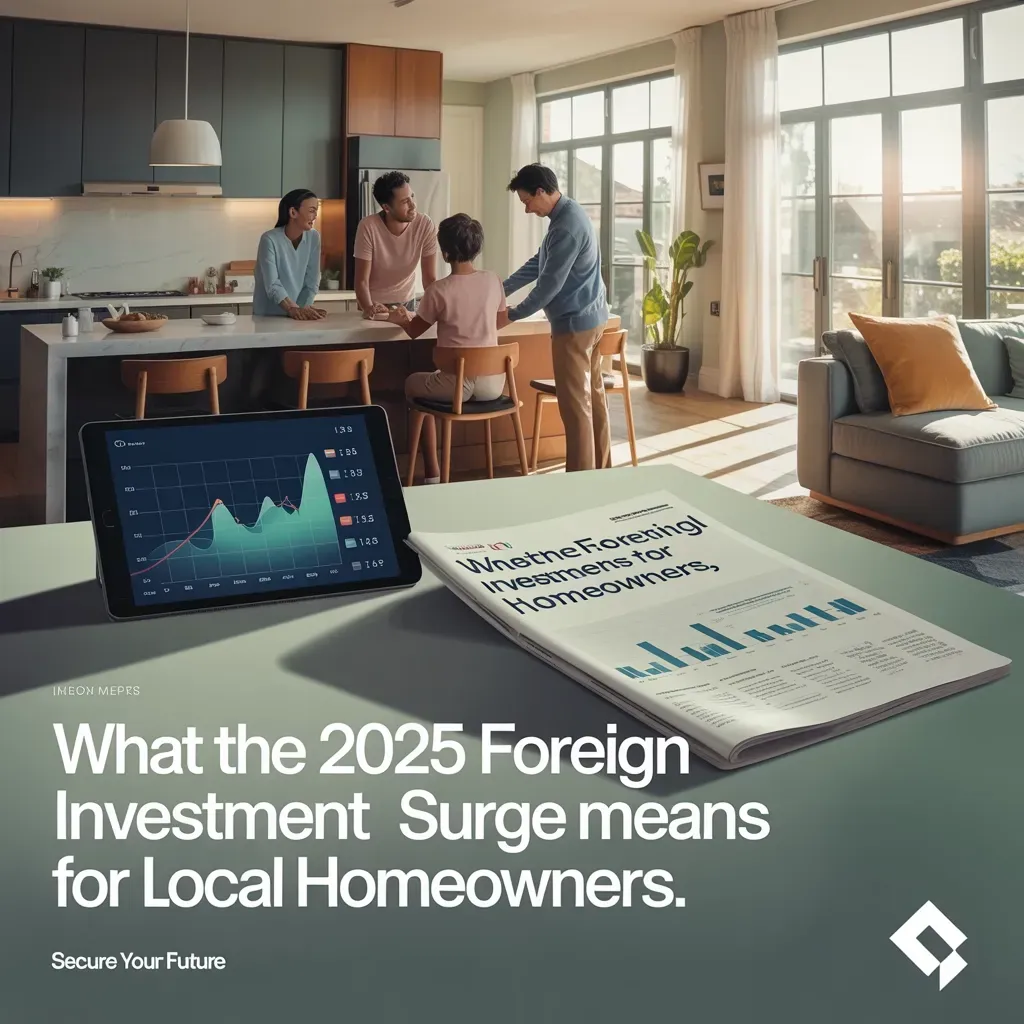
What the 2025 Foreign Investment Surge Means for Local Homeowners
The New Wave of Foreign Capital
The American real estate market is experiencing a significant shift in 2025. Foreign investment has surged to $56 billion, with a remarkable 44% increase in the number of properties purchased by international buyers compared to the previous year. This influx of foreign capital is reshaping local markets across the country, particularly in hotspots like Florida, California, Texas, New York, and Arizona.
But what does this mean for you as a local homeowner? Whether you're considering selling your property, worried about your home's value, or simply curious about market trends, the foreign investment surge has implications that touch nearly every aspect of the housing market.
By the Numbers: Understanding the 2025 Investment Landscape
The statistics tell a compelling story about how foreign investment is changing the game:
47% of foreign buyers are making all-cash purchases, compared to just 28% of domestic buyers
The median purchase price for foreign buyers stands at $494,400
56% of "foreign" buyers are actually immigrants or visa holders already living in the U.S.
Single-family homes represent 77% of all foreign purchases
Florida leads with 21% of all foreign purchases, followed by California (15%) and Texas (9%)

Cash is King: How Foreign Buyers Are Changing Transaction Dynamics
Perhaps the most significant impact on local homeowners comes from the high percentage of cash offers. Nearly half of all foreign purchases are made without financing, giving these buyers a substantial advantage in competitive bidding situations.
For sellers, this trend presents a golden opportunity. Cash offers typically mean:
Faster closings with fewer contingencies
Reduced risk of financing fall-through
Often higher net proceeds due to reduced transaction costs
"Cash offers have become increasingly competitive in markets like Dallas-Fort Worth," says Joe G at Real Estate Diplomats. "Local homeowners who are selling can benefit from these streamlined transactions, but those looking to buy may find themselves at a disadvantage against international investors with deep pockets."
For those concerned about competing with cash buyers, services like HomeOffersEZ can help level the playing field by providing quick, competitive cash offer options for local buyers.
The Regional Impact: Not All Markets Are Created Equal
The foreign investment surge isn't affecting all areas equally. Understanding regional variations is crucial for homeowners trying to gauge how their specific market might be impacted:
Sun Belt Dominance
Florida continues to lead the pack, capturing 21% of all foreign real estate investments in the U.S. This concentration has intensified competition in markets like Miami, Orlando, and Tampa, pushing prices upward and creating a seller's market.
Texas Transformation
With 9% of foreign purchases, Texas markets—particularly Dallas-Fort Worth, Austin, and Houston—are seeing increased international interest. This has supported property values even as inventory has increased in some areas.
Price Corrections Creating Opportunity
Some markets that saw rapid pandemic-era appreciation are now experiencing corrections. Phoenix has seen prices drop 6.9% from their 2022 peak, while cities in Tennessee like Nashville and Knoxville have increased inventory levels. These corrections are creating entry points for foreign investors while potentially stabilizing prices for local sellers concerned about significant depreciation.

Who's Buying and Why It Matters
Understanding the motivations behind foreign purchases helps predict their impact on local communities:
Primary Residences vs. Investment Properties
The majority of foreign buyers are purchasing properties for:
Primary residence (44%) - These buyers are likely to integrate into communities, contribute to local economies, and maintain properties to high standards.
Vacation homes (17%) - These properties may sit vacant for extended periods, potentially affecting neighborhood dynamics and local businesses.
Investment rentals (39%) - This category can either add needed rental inventory to tight markets or potentially drive up rents if investors target luxury segments.
Demographic Shifts
It's important to note that 56% of "foreign" buyers are already living in the U.S. as immigrants or visa holders. This means many international purchases are actually supporting community development rather than representing absentee ownership.
The Dual Impact on Home Values
For current homeowners, the foreign investment surge creates a fascinating paradox:
The Upside: Value Stability and Appreciation
In markets favored by foreign investors, home values tend to show greater resilience during economic downturns. The influx of capital provides a cushion against market corrections and can drive appreciation above national averages.
This is particularly evident in luxury markets and areas with high amenity value, where foreign buyers often focus their attention. For homeowners in these areas, the investment surge may translate to stronger equity positions and greater financial security.
The Downside: Affordability Challenges
The same forces that boost home values can create affordability challenges for local buyers. When cash-rich foreign investors compete for properties, bidding wars become more common, and prices can escalate beyond what local incomes can support.
This dynamic can make it difficult for existing homeowners to upgrade within their communities and may push first-time buyers to more distant, less desirable locations.

Strategic Considerations for Local Homeowners
Given the realities of increased foreign investment, local homeowners might consider several strategic approaches:
For Those Looking to Sell
Timing the market - Properties in high-demand areas may command premium prices in 2025, making it an opportune time to sell, particularly if you own a property that appeals to foreign buyers.
Marketing internationally - Working with a broker who has international connections can help target your property to foreign buyers. At Real Estate Diplomats, we've developed marketing strategies specifically designed to reach qualified international investors.
Highlighting investment potential - If your property has rental potential or is in an area with strong appreciation history, emphasizing these aspects can attract investment-minded foreign buyers.
For Those Planning to Buy
Get creative with financing - Programs like Trade-In or Rent-to-Own can help local buyers compete in markets dominated by cash offers.
Look to emerging neighborhoods - Areas just beginning to attract foreign investment often represent the best value, offering appreciation potential without the extreme competition of established hotspots.
Consider new construction - With many foreign buyers focused on existing inventory, new developments may offer local buyers less competition and more negotiating leverage.
Community and Economic Impacts Beyond Housing
The foreign investment surge extends beyond simple housing transactions to shape communities in several ways:
Economic Stimulus
Foreign investment typically brings additional capital into local economies through:
Property renovations and improvements
Higher property tax contributions
Increased spending at local businesses
Job creation in property management and services
Neighborhood Evolution
Areas with high concentrations of foreign investment often experience:
Accelerated development of luxury amenities
Changes in retail and service offerings
Cultural diversification
In some cases, reduced community cohesion if properties remain vacant
Looking Ahead: What's Next for Local Markets?
While predicting real estate trends is never foolproof, several factors suggest the foreign investment surge may continue:
U.S. real estate remains perceived as a safe haven asset class globally
Political and economic instability in other regions continues to drive capital to American shores
The post-pandemic recovery has reinforced America's position as a desirable location
Despite rising prices, U.S. real estate still offers value compared to some international markets
However, potential headwinds include:
Changes to tax policies affecting foreign ownership
Fluctuations in currency exchange rates
Potential restrictions on foreign purchases in high-demand areas
Rising interest rates affecting investment returns
The Bottom Line for Local Homeowners
The 2025 foreign investment surge represents both opportunity and challenge for local homeowners. Those positioned to sell in high-demand markets may find themselves with unprecedented leverage and potential profits. Meanwhile, those looking to buy may need to employ creative strategies to compete effectively.
The key is understanding your local market's specific dynamics and how foreign investment is affecting your particular neighborhood and property type. Working with professionals who understand both local conditions and international buyer preferences can help navigate this complex landscape.
At Real Estate Diplomats, we're committed to helping Dallas-Fort Worth homeowners make informed decisions in this evolving market. Whether you're looking to capitalize on foreign buyer interest through our cash offer programs or need guidance on your next move, we're here to help you turn market changes into personal opportunity.
Ready to discuss how the foreign investment surge might affect your specific situation? Schedule a call with our team today.
